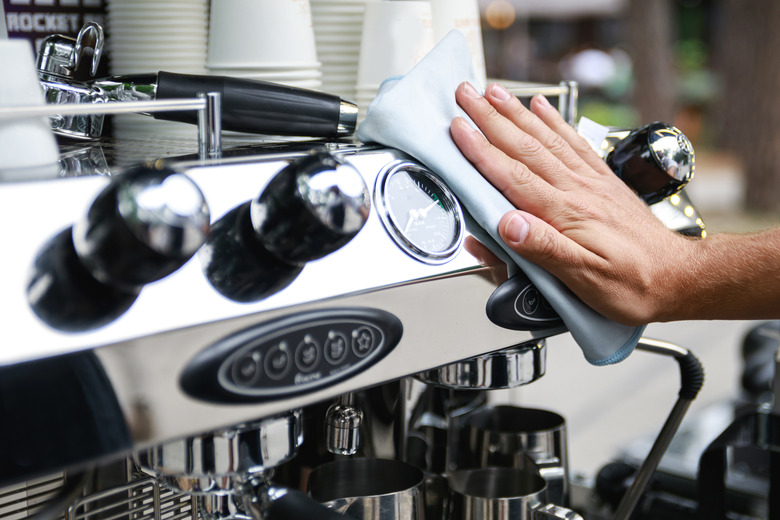What Dissolves Coffee Bean Oil?
All coffee machines are prone to accumulations of coffee oil, imparting increased bitterness and unpleasant off-flavors to the brews they make, according to Roasty Coffee. It is important to keep any implements that come in contact with the beans or brew clean in order to prevent this. In French presses, the filter is the most commonly affected surface, and the same is true for drip coffee makers. Commercial espresso machines need to have their heads cleaned several times throughout the day to avoid producing bitter coffee.
Although detergents are a quick and effective way to dissolve coffee oil, they can leave behind an unpleasant residue of their own that is difficult to remove. Natural solutions can be found in household ingredients that are inexpensive and generally effective, especially if keeping your coffee making device clean is part of your regular routine.The most effective way to dissolve coffee residue that's been built on, or oily residue that's been left behind, will ultimately depend on your device and how dirty it is.
How to Use Dish Soap
How to Use Dish Soap
Dish soaps do in fact dissolve coffee oils, however, they are among the least effective of all available cleaners. Dish soaps also frequently leave a soap or perfume residue behind on the surfaces being cleaned. When using dish soaps to clean a French press or drip coffee machine, it is important to thoroughly scrub the surface under running water to mechanically remove any soap residue from the filter. Finally, it is recommended that you never use dish soap in an espresso machine as it may alter the taste of your brew.
Commercial Coffee Machine Cleansers
Commercial Coffee Machine Cleansers
Commercial detergents are both expensive and effective. They have caustic properties that enable them to remove calcium alkali and other mineral deposits in your coffee machine. Like when using dish detergents, your equipment must be thoroughly scrubbed and rinsed to remove any lingering cleaning chemicals. It is not necessary to clean mineral deposits out of coffee machines on a regular basis, though; in fact, French presses never require demineralization.
Use Vinegar to Cut Grease
Use Vinegar to Cut Grease
Vinegar is an inexpensive and highly effective way of removing coffee oils — 0ne part white vinegar is mixed with two parts distilled water to create the mixture in which the affected area is soaked, says Puracy. It takes at least six hours of soaking to break up a heavy accumulation of oils and allow it to be scrubbed away with a stiff nylon brush, and less soak time is required if cleaning is performed regularly, and like other methods, it is important to thoroughly rinse all parts cleaned to remove the vinegary smell. Vinegar may be used to clean espresso machines, but they must be backflushed after treatment.
Effectively Clean With Orange Oil
Effectively Clean With Orange Oil
Natural orange oil cleansers are among the best chemical surfactants available for removing coffee oils, and may prevent oily film on coffee once its brewed. They quickly and effectively remove oil accumulations and require no soaking, making for a simple and effective cleansing. Additionally, they rinse away quickly, leaving very little residual aroma or flavor. Although relatively safe and non-toxic, it is important that they be used at the recommended dilution or they can irritate the skin.
